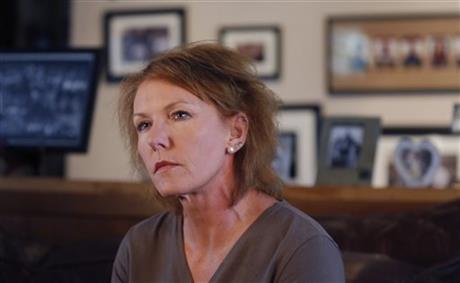
By BILL DRAPER
Melinda Coleman listens to a question during an interview in her home in Albany, Mo., Wednesday, Oct. 16, 2013. Coleman says justice was denied when charges were dropped against the boys that her 14-year-old daughter said sexually assaulted her and a 13-year-old friend. (AP Photo/Orlin Wagner)
MARYVILLE, Mo. (AP) — A northwest Missouri prosecutor said Wednesday that he’s asking for a special prosecutor to look at the case of a 14-year-old girl who says she was plied with alcohol and raped by a 17-year-old acquaintance.
The announcement from Nodaway County prosecutor Robert Rice came amid increased scrutiny in recent days over how he handled the case.
Melinda Coleman, the mother of 14-year-old Daisy Coleman, claims justice was denied when Rice dropped felony charges against the 17-year-old boy in March 2012, two months after Coleman found her daughter passed out on the family’s front porch in below-freezing temperatures. The mother also has said the family had to move from the small town of Maryville because of harassment over the allegations.
The county sheriff and Rice have insisted their investigation collapsed after the Colemans became uncooperative with investigators and refused to answer questions. Coleman says she and her daughter did cooperate and that investigators didn’t do enough to push the case forward.
Rice stood behind his earlier statements at a news conference Wednesday but said he was asking a court to appoint a special prosecutor because of publicity surrounding the case and recent media stories questioning the integrity of the justice system in the county. Rice said the special prosecutor will investigate the case and decide whether charges will be refiled.
The incident happened in January 2012, after Daisy and a 13-year-old friend left the Colemans’ house in the middle of the night to meet some boys.
Daisy’s 13-year-old friend also said she was forced to have sex with a 15-year-old, while another 17-year-old allegedly recorded the incident on a cellphone. The 15-year-old was charged in the juvenile system. Charges against the 17-year-old who allegedly videotaped the incident were also dropped in March 2012.
Daisy said the boys gave her alcohol and she doesn’t remember much of what happened next. The boys said the sex was consensual.
Rice has said there wasn’t enough evidence to pursue the charges because the accusers had stopped cooperating and asserted their Fifth Amendment right against self-incrimination. Rice said Wednesday that he had been concerned about the Colemans’ decision and so he had asked that they assert their Fifth Amendment right under oath in a deposition. He said he couldn’t release the deposition because it’s a closed record.
Asked to speculate on the accusers’ reasoning, Rice said, “I can’t go into their minds. I don’t know. I can tell you this: We were very careful, very deliberate to make sure that they recorded that there was no misunderstanding, that they understood that at that time when they invoked their Fifth Amendment right that by doing so was going to force the dismissal of the case, that they understood that.”
Melinda Coleman did not immediately return a phone call seeking comment after Rice’s announcement. But in an interview with The Associated Press earlier in the day, Coleman insisted she would help investigators in any way she could, even if the case never made it to trial.
“I think just having it looked at fairly and having other people know how much we were bullied goes a long way. Even if that’s all that ever comes out of it,” she said. “That may be enough to move on and have some peace and some security.”
The Associated Press does not generally name victims of sexual assault but is naming Daisy Coleman because she and her mother have been granting public interviews about the case. The AP is not naming the boys because there are no longer active charges against them.
Robert Sundell, who represented the teen accused of assaulting Daisy, was out of the office Wednesday and didn’t immediately return phone message left before and after the news conference.
In a statement Tuesday, Sundell said his former client cooperated with the investigation and freely admitted to the sexual encounter. He said that while many may find his former client’s behavior “reprehensible,” the legal issue was whether a crime was committed.
The case has drawn international attention to Maryville and city officials said they’ve had to increase police patrols because of threats made against residents and the city in general.
However, Coleman said harassment her family faced in the town was from just a few residents, mainly friends and family members of the accused boys. She said that otherwise, she liked the town.
The mother of the boy accused of assaulting Daisy pleaded with people to stop making threats against people who are from Maryville, telling reporters that some people no longer feel safe going to work or school.
The case has drawn comparisons to one in Steubenville, Ohio, where two 17-year-old high school football players were convicted of raping a West Virginia girl after an alcohol-fueled party in 2012. The case was furiously debated online and led to allegations of a cover-up to protect the city’s celebrated football team.
Before Rice’s announcement Wednesday, pressure had been building on Missouri Attorney General Chris Koster to intervene. Koster’s office has said it had no authority under state law to reopen the investigation on its own.
Missouri House Speaker Tim Jones, a Republican who had called on the Democratic attorney general to step in, said the decision to seek a special prosecutor is good progress.
“However we get to the point of examining this matter more closely is really irrelevant to me,” said Jones. “The point is there seemed to be too many questions out there about this case for it to just be suddenly closed.”



